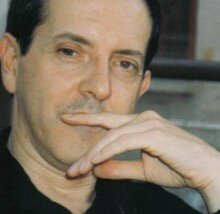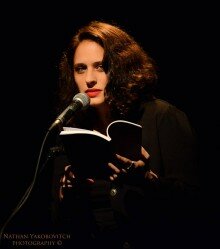The Head That Used To Fly
It is impossible to write about this book specifically, about this author in particular without music. It is not by chance that I’ve put on some Jethro Tull. This is such an ancient British band. I’ll keep writing while the record is playing. I’ll actually keep writing until the band stops playing in my head. This will last an eternity though, because I’m beginning with the first of their ten albums from 1968 to 1977 and going through them one by one. Songs from the Woods is the last album. One summer in the mid-1980s, I brought it to Lviv and played it for a friend of mine, who happened to be a poet. The next three days we listened to these songs thirty or so times. My friend’s name was Viktor Neborak, and he was the author of this book.
1. Half of hell runs up to watch the start
The Flying Head is the first truly “Bu-Ba-Bu” book. Perhaps, I need to explain this extremely unusual pronouncement. When The Flying Head was published in the early spring of 1990, we as a group (a literary performance trio called the Bu-Ba-Bu's) had already existed for five years and could boast of a dozen colossal and not particularly colossal performances. However, we didn’t have books like this before. Previously, Viktor himself had published his early attempt entitled Amber Time (1987). As a matter of fact, it was published in a single volume with the no less juvenile Campfire in the Rain by Oleksander Irvanets. The Lviv-based Stone Mason Publishing House made a single cover for their book and a third author was proposed — S. Rachynets, who has never been heard from since. The word Rachynets, which literally translates as “a little crayfish,” is a peculiar mixture of the two authors’ last names, if you look at Nebo-rak as two roots “nebo” (sky) and “rak” (crayfish), something at which his American translator hints. However, the Lviv Stone Masons never knew that the third member of Bu-Ba-Bu was me. By the time The Flying Head appeared, I had my two poetry collections published, The Sky and City Squares (1985) and Downtown (1989). The Sky and City Squares briefly mentions carnival, while Downtown turned out to be pretentious throughout, often filled with pathos and mostly sentimental. Neither of them should be considered Bu-Ba-Bu books, except in a few select passages.
However, The Flying Head is totally and utterly a Bu-Ba-Bu book, and it is also the first one. I mean, from the very first to the very last line, it consciously manifests the burlesque, farce and buffoon aesthetics of the Bu-Ba-Bu's. This is not to say though that it does not contain earlier texts, written before April 1985. For instance, I first saw a typescript copy of "an arch-modern show of poems", Stunning Reincarnations as early as 1984. Apparently, it was Mykola Riabchuk who showed it to me. To many of us he was sent by Providence in the combined form of a spiritual father and teacher, or simply as an elder brother and tempter. I must take the opportunity to mention the exhilarating envy that overwhelmed me while I read the first page of Stunning Reincarnations. It was one of those challenges that urges you to reincarnate yourself in an even more stunning manner in response.
I have one more observation that I must not forget to make. This book would not have been published if, in 1986, Viktor Neborak had not moved to Kyiv [Kiev, ed.], or rather, had not turned himself into a human pendulum, swinging back and forth between Kyiv and Lviv, the latter of which was still a metropolis back then. Thus it was precisely at the juncture of Kyivan-Lviv space-time that the pendulum visions appeared, that is, the pendulous swaying of this book.
The word ‘metropolis’ probably appeared here in connection with the Kyiv Metro. Commuting underground in a Kyiv Metro car, Viktor Neborak must have noticed a reflection in the window of his own head, cut at the neck by a subway cable. This meant liberation. The severed head of Orpheus Neborak made a start.
2. INVITED TO APRIL'S FUNERAL IS everyone who wants to drink...
This book is permeated with the aroma of alcohol and the haze of drunken orgies. It’s saturated because of them. One can only wonder how all of this could have gotten through the dreadful publishing censorship, which from 1985 was supposed to perform the additional duty of tracking down and neutralizing any signs of propaganda about obsessive drinking and alcoholism. There is only one concession, according to my observations, that the dreadful censorship won in The Flying Head—a line in Stunning Reincarnations, that I remember from the typescript, “and even though we’re drunk, we’re tautly stringed slim” appears in the book as “and we’re transparent, tautly stringed slim.” The loss is obvious, even if you assume that in this particular episode transparency is just another word that a certain circle of people will use to denote drunkenness. Concerning the title of a later cycle, Anti-Alcohols, the author’s cunning little trick of changing the titles of some poems (Beer, Wine, Vodka, and Cognac) to Roman numerals actually makes the whole cycle more refined. By the way, in the cycle’s title one can not help but note the allusion to Apollinaire, whose collection published by The Pearls of World Poetry Press in Mykola Lukash’s translation, we used to carry during those years in our breast pockets, to the left where the heart is.
As one of them, that is, a witness, a character and an actor of that theater, I can swear to the fact that ritualistic alcoholism was a way of life for us back then. This is not anything exceptional in the setting of other literary environments and generations, particularly Ukrainian ones. What is exceptional, to my mind, is that in our case this alcoholism was light and Daoist-like. We had to drink in a nice way, easily and cheerfully, without getting plastered at dreadful tables and losing our physical and astral forms. Alcohol was fun, not an obligation or an addiction. Hence its alternative metaphysics. It was a festive substance, and The Flying Head has about as many festivities as there are in a Hemingway novel. In other words, festivity is at the very center and, at the same time, it is permanently mobile; and alcohol is in abundance there, just as in Hemingway. First of all, these are streams of champagne, although we never were deficient in beer, wine, or enough booze for three, and also various sunny cocktails and golden drinks. However, champagne creates a sparkling inner tension, while its streams visually resemble ejaculations, something that I will mention later.
My personal, almost physiological feeling is that all of the drunken revelry in the book is basically a spring initiation ritual. Perhaps this is really the funeral of April, the time when April is over, but May hasn’t yet come. This is spring itself with its piquancy; this is a disastrous giddiness about life, its aromas and cherry blossoms; this is a headache from oxygen, a buzzing in the ears, a throbbing in the temples, a pulsation in the genitals. All of this is so close to Antonych’s poetry, which means that although Antonych is buried at the Yaniv Cemetery, he was and is still alive among us. No wonder, the influence of his poetry — that we treated as one of those breast-pocket books — was much greater on us than Apollinaire’s. After all, Antonych was an original, not a translation.
But not far from here are the rest of the biped (featherless) menagerie: Yurko Kokh, an active member, in a quite timely way, began to produce his illustrations of their faces. The very half-hell or half-paradise — including Viktor Morozov, Kostyk Moskalets, Ivan-Bakshtein, the poet Irena, Orysia, Olesia, little Pantagruel, or rather Pantagruel the Lesser*, the rock band Lucifer, and the Queen’s Children, Yuzio and Bazio — can still be recognized in them.
The Flying Head is a book for brothers and sisters in spirit. They recognized themselves in it and thus tried to follow its precepts.
3. …and a fervent preacher of the Kama Sutra
This book is permeated with sexuality and eroticism. Actually, this is a book for and about sisters (heteras). Heretofore unknown in Ukrainian poetry sex bombs, nymphs in punk style, the furies with shapely legs like streams as well as never before depicted in such contexts schoolgirls, college girls, mistresses, Lviv sluts (girls from music) fill this force of nature with their whispers and moans. This resembles the hissing of snakes before they copulate. Getting back to the uneasy relations with the dreadful censorship, I think the experience of the censors with the porn industry, which was then quite accessible on pirate videos, was not quite extensive. Otherwise, one would assume sabotage on their part. For instance, White streams run into your open body (the already mentioned champagne ejaculation). You moan. You clumsily touch the night.
Or: You mixed her hair with white.
Or: She has a premonition / of sweet darkness and ascension / with thick
stream of warm seeds…
Or: An orange stream splashes / onto scorching sands
Or finally: the grad student in the lips of venuses.
To this day I don’t know whether it was really a loss of attentiveness. Where are You now, oh censor number BF27596?** You haven’t just dozed off over these pulsating erect writings, have you?
Meanwhile, I am forgetting to say something very important. In fact, all the poems in The Flying Head have been written for recitation. We, the BuBaBists, used to enjoy reciting them, taking turns within our circle, beginning from the very beginning, when our voices used to tremble and our mouths used to dry up. However, starting from December 1987 we began to perform publicly. It appeared right then. A feeling that the public was a mistress. Mostly his, Viktor’s, mistress. The female exclamations during recitals between lines and words were quite pronounced.***
Of all our public recitals, both those accompanied with music and ballet as well as those without, I recall three particularly responsive audiences.
The first one gathered back then, in December 1987, was in the Molodyi (‘Young’), then still the Molodizhnyi (‘Youth’), Theater. That time we did get a lot of laughs, but I think it was mostly a kind of affected masking, the laughter of mermaids and water nymphs that had been tickled to death.
The second was in the Lviv Philharmonic Hall in May 1988, where, to be honest, we served as an addendum to the Ne Zhurys! (“Don’t Worry!”) Group. Even though we were just an addendum, Viktor Neborak together with Kokh’s buttocks on slides drove everything into ecstasy that could be driven into ecstasy, including the ladies of Halychyna [the western area of Ukraine], after he performed his ‘The Queen of the Cretins.’
The third audience packed the Lviv Opera House during the “Chrysler Imperial” performance in fall 1992. Then it was not yet called Neborock. It was the “Neborak-rock-band,” a project of Viktor’s younger brother, in which Viktor decided to recite his poems to the music, but that’s not the point. What I mean to say is how the Audience called out to him with their one thousand voices.****
4. i’m a loser i lost everything
Paradoxically, these words were written by a person, named Viktor. A Viktor, who lost everything, is really a neborak, which in Ukrainian means a “miserable loser.” Once, Viktor Neborak himself turned his attention to this aporia regarding his first and last names: a Conquered Winner. A superman, sitting like a statue and working arduously on his poems in The Flying Head, has to be self-ironic, because what else can he do? His sculpture had to be smashed for schizophrenia.
In the first half of the 19th century, tears were the best reaction of an audience to a poem. Poetry did not make any sense if it could not drive the audience to tears. To cry meant to enjoy poetic feeling most intensely.
Beginning with the second half of the 20th century, however, it is laughter that has become the new embodiment of poetic sensibility. The reasons for this were probably created by the general retreat from intellectual and artistic discourse as well as from lofty ostentatious gravity and pathos. In other words, into the dominance of something called ‘postmodernism,’ which like any other beautiful simulacrum developed into foul language because it was used pointlessly and all too often. In any case, when The Flying Head was published, all of this was just beginning with us, so the book was called a good example of postmodernism. The theoretical foundation that we had just recently reread from Bakhtin, Rabelais, carnival, and the folk culture of laughter were patchworked together into the book. Therefore, it was a time of national rebirth, the national Ukrainian version of all this Rabelaisian stuff (Kotlyarevsky plus).
This dragged behind it not so much a diving into the tradition, but rather a playing with it.
Thus, The Flying Head is the flying baroque, the neobaroque, the neboroque.
5. And Bu and Ba and Bu-Ba-Bu
Many years later I am still extremely grateful to this book and its author. Every line, written and uttered by him during those times, compelled me also to write and utter something. I have the impertinence to assume it was mutual. It was like a mutual igniting. The history of world literature has never before known this kind of magnetism and anti-magnetism, sorry for my inadvertent pathos. It used to be an internal competition and reciprocal transformation.
And what was my Recreations if not a response to The Flying Head? And what were ‘The Flea Market Portraits’ or ‘A Traveler’s Sketches in July’ if not days and nights we had spent together somewhere in various workshops, art studios and museums of pathological anatomy?
I could keep recalling endlessly what had been born when and resulted in what. This is the sort of memory I have, a space clattered with biographical junk.
Who remembers the name of the last song from the woods? Correct — ‘Fire at Midnight.’ It only lasts two minutes and twenty-five seconds. Will I really have enough time to finish this before it comes to an end? Or maybe I don’t need to add anything, do I?
Citations and allusions hidden in plain view are italicized.
* The Kyivan poet Ihor Malenkyi is meant here. Ed.
** This was the anonymous secret code of the censor that appeared at the back of the book. Ed.
*** I recall one of our friends once telling Viktor the next day after his recital, “Listen, I am so grateful to you for what happened yesterday! My wife came back home so excited…”.
**** I was not at his performance with the VV rock band at St. Andrew’s Hill in Kyiv. They say, it was a huge success for the punk and metal and rock crowd (that was May 1989, during the annual Days of Kyiv celebration).









